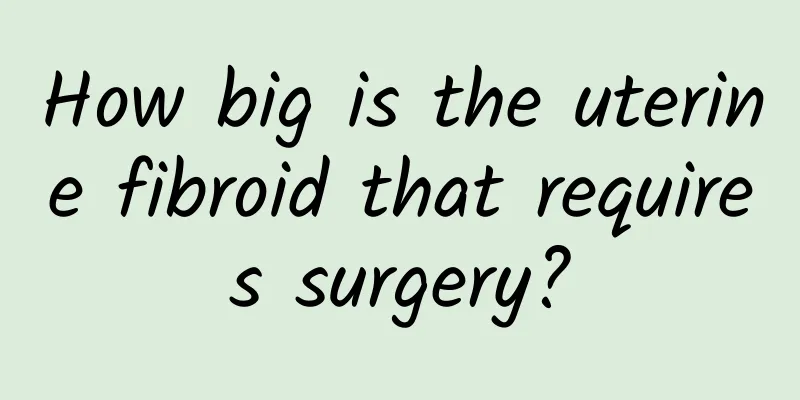How big is the uterine fibroid that requires surgery?

|
How big is a uterine fibroid that requires surgery? Generally speaking, when a uterine fibroid is larger than 5 cm in diameter or causes obvious symptoms, it is recommended to consider surgical treatment. 1. The size and symptoms of uterine fibroids are important factors in deciding whether to have surgery. If the fibroids are smaller than 5 cm and have no symptoms, surgery is usually not required and only regular monitoring is required. However, if the fibroids are larger than 5 cm or cause severe symptoms such as menorrhagia, abdominal pain, frequent urination, etc., surgery may be a necessary option. 2. The growth rate of uterine fibroids is also a consideration. If the fibroids grow rapidly in a short period of time, surgery may be required as soon as possible. Rapidly growing fibroids may indicate potential malignant changes, although this situation is relatively rare, but it still needs to be treated with caution. 3. The severity of symptoms directly affects the quality of life. If uterine fibroids cause severe menstrual pain, anemia, or compress surrounding organs, affecting daily life and work, surgery may be an effective way to improve symptoms. Especially for those patients who have tried drug treatment but have not been effective, surgery may be a better choice. 4. Age and fertility plans are also important considerations. For young women, especially those who have fertility plans, doctors will prefer conservative treatment to avoid damage to the uterus. For women who have completed their fertility plans or are in menopause, surgery may be a more direct and effective treatment. 5. The choice of surgical method also needs to be determined according to the specific situation. Common surgical methods include laparoscopic surgery, traditional laparotomy and hysterectomy. The specific method to be chosen depends on the size and location of the fibroids and the patient's physical condition. Laparoscopic surgery is less invasive and has a quick recovery, but it is not suitable for all situations; traditional laparotomy is suitable for larger or complexly located fibroids; hysterectomy is suitable for patients with severe symptoms and no fertility needs. 6. Postoperative recovery and care are also very important. After surgery, you need to rest, avoid strenuous exercise, and follow the doctor's advice for recovery. You should pay attention to a balanced diet and eat more iron-rich foods to prevent anemia. Regular checkups are also very important to ensure that there is no recurrence or other complications. 7. For patients who are not suitable for surgery or do not want surgery, drug therapy and minimally invasive treatment are also viable options. Drug therapy can relieve symptoms and slow the growth of fibroids, but it usually cannot completely eliminate fibroids. Minimally invasive treatments such as high-intensity focused ultrasound (HIFU) and uterine artery embolization (UAE) can also control the growth and symptoms of fibroids to a certain extent. Through this information, I hope to help everyone better understand the treatment options for uterine fibroids. If you or your family members have similar problems, it is recommended to consult a professional doctor as soon as possible to develop a personalized treatment plan based on the specific situation. |
<<: What's the matter with two lines after the abortion test?
>>: What to do if your breasts hurt during irregular menstruation
Recommend
Experts warn that complications of cervicitis should not be underestimated
Many women suffer from gynecological diseases, ce...
Healthy Diet for Bartholinitis
What are the healthy dietary treatments for Barth...
What are the symptoms of chronic cervicitis? Recommended treatments for chronic cervicitis
Chronic cervicitis is an erosive inflammation of ...
What is the best way to prevent cervical erosion?
Cervical erosion is extremely harmful to the huma...
What is the relationship between hyperprolactinemia and amenorrhea?
Hyperprolactinemia is the most common pituitary d...
Can I drink brown sugar ginger tea for menstrual cramps? Take good warming measures
Dysmenorrhea is a symptom that every girl will ex...
Yogurt helps intestinal motility and improves metabolism, making it a good helper for weight loss? Low-calorie yogurt recipes can help you lose weight
Yogurt helps intestinal peristalsis and improves ...
Follow-up care after surgery for congenital absence of vagina
Congenital absence of vagina not only threatens o...
Will ectopic pregnancy cause abdominal pain? What are the characteristics of abdominal pain caused by ectopic pregnancy?
Ectopic pregnancy may cause abdominal pain. The i...
What should I do if my menstrual period is long and heavy?
What should I do if my menstrual period is long a...
Does adenomyosis affect fertility in patients with
Can I get pregnant with adenomyosis? Will the fer...
How many days should I stay in bed after a miscarriage? Experts will show you the answer to this question
The care after a miscarriage is very similar to t...
Mechanism of dysfunctional uterine bleeding caused by sex hormone secretion disorder
The normal menstrual cycle is a biological clock ...
If you have adnexitis, you may experience varying degrees of abdominal pain.
If you have adnexitis, you may experience varying...
How do pathogens invade the body and cause pelvic inflammatory disease?
How do pathogens invade the body and cause pelvic...









